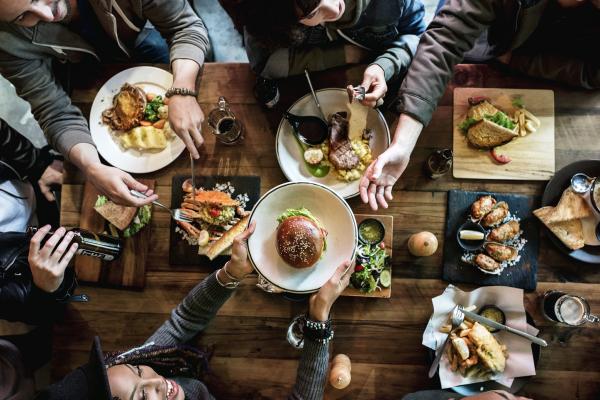
Support for the food and drink industry – Eat Out to Help Out Scheme
Last updated 28 July 2020
On 8 July the Chancellor announced a new UK wide scheme to support restaurants and other eating establishments – the Eat Out to Help Out Scheme (the ‘scheme’).
The scheme gives diners a 50% discount (up to a maximum of £10 per head) on purchases of food and non-alcoholic drinks from registered businesses on specific days, which the business can then reclaim from the Government.
Which businesses qualify?
The scheme is open to qualifying restaurants, that is establishments which:
- are registered as a food business with the relevant local authority on or before 7 July; and
- sells food and/or non-alcoholic drinks for immediate on premises consumption.
The definition of restaurant for these purposes is quite wide, and also includes cafes, canteens, hotel dining rooms, pubs and workplace and school canteens.
For the purpose of the scheme, on premises means any area (outdoor or indoor) which is set aside for eating and drinking by customers, whether or not that area is also used by customers of other establishments.
In line with this, HMRC guidance indicates that the following should qualify for the scheme:
- Restaurants / cafes / pubs that serve food and have dedicated indoor or outdoor seating areas
- Outlets in food courts
- Stalls at stadiums / attractions (provided there is a designated area belonging to the business and for use by its customers)
- Workplace and school canteens (unless food is provided free of charge to employees or students)
However, the following wouldn’t normally qualify:
- Hotels providing room service only
- Take-aways / mobile vans which put tables and chairs on the pavement outside.
- Onboard catering on planes
- Onboard catering on trains (unless there is a specific eating area or dining car)
Qualifying businesses are required to register to take part in the scheme (see below for more information on registration).
Businesses are able to register and benefit from the scheme even if they have accessed other COVID-19 government support such as the coronavirus job retention scheme (CJRS) or self-employment income support scheme (SEISS).
What sales does the scheme apply to?
The scheme only applies to qualifying sales, which are defined as:
- sales of food or non-alcoholic drinks
- for immediate consumption on the restaurant premises
- from Monday to Wednesday between 3 to 31 August 2020.
However, qualifying sales do not include sales of food or drink:
- for consumption at a private party, reception or similar function; or
- which form part of a wider package (e.g. bed and breakfast accommodation).
How is the discount calculated?
A discount of 50% is given on qualifying sales, capped at £10 (VAT inclusive) per head.
There is no flexibility, and businesses cannot choose to offer a lower or higher level of discount than that provided under the scheme.
The discount cannot be applied to:
- service charges;
- alcoholic drinks;
- takeaway food; or
- tobacco.
The scheme can be used in conjunction with other discounts to diners, but these must be applied first before calculating the amount subject to discount under the scheme.
The discount available is capped at £10 per head, but where there is more than one diner in a party there is no need to consider what each has specifically ordered. Instead, the discount to be applied to the overall bill is capped at £10 multiplied by the number of diners.
HMRC guidance includes worked examples of how to calculate the discount in practice.
How do eligible businesses register?
Eligible businesses are required to register for the scheme on GOV.UK. Registrations opened on 13 July and will close on 31 August 2020.
Agents cannot register businesses for the scheme, or make claims on behalf of their clients.
To register, businesses will need:
- their Government Gateway ID and password (if they do not have one, they can create one when they register)
- the name and address of each establishment to be registered (unless they are registering more than 25 establishments, in which case they can provide a link to a website with details of each establishment instead
- a UK bank account number and sort code for the business, and the address associated with that bank account.
They may also need their:
- VAT registration number (if applicable)
- employer PAYE scheme reference number (if applicable)
- Corporation Tax or Self Assessment unique taxpayer reference (UTR).
Registered businesses will be given a reference number (which they will need to claim reimbursement) and can download promotional materials. They will also be included on a publically available list of registered establishments.
How will registered businesses claim back discounts given under the scheme?
The online claims service will open on 7 August, and close on 30 September 2020.
Agents will not be able to make claims on behalf of their clients.
Claims can be made on a weekly basis, but businesses will have to wait 7 days from registration to make a claim.
HMRC will pay eligible claims within 5 working days.
What records do businesses need to keep?
For each day a business uses the scheme, they must keep records of the:
- total number of people who have used the scheme in their establishment;
- total value of transactions under the scheme; and
- total amount of discounts they’ve given
If using the scheme for more than one establishment, records must be kept for each.
How will amounts claimed be treated for tax purposes?
All amounts received through the scheme will be treated as taxable income.
VAT will still have to be paid based on the full amount of customers’ bills (i.e. before the discount is applied).
More information
Guidance on GOV.UK will be updated as more information on the scheme is released.
On 27 July, the government published a short briefing pack aimed at agents with clients who may be eligible to benefit from the scheme.
A detailed Treasury Direction was also published in relation to the scheme on 7 July 2020.










